STATEHOUSE REPORT | ISSUE 23.31 | Aug. 2, 2024
BIG STORY: Heat is on for S.C. leaders as global temps keep rising
MORE NEWS: S.C. Supreme Court upholds death penaltyPreview (opens in a new tab)
LOWCOUNTRY, Ariail: The red hats
COMMENTARY, Brack: Sales tax holiday remains inane tax bribe
SPOTLIGHT: Charleston Animal Society
MYSTERY PHOTO: Colorful
FEEDBACK: Thanks for saying what needed to be said
Heat is on for S.C. leaders as global temps keep rising
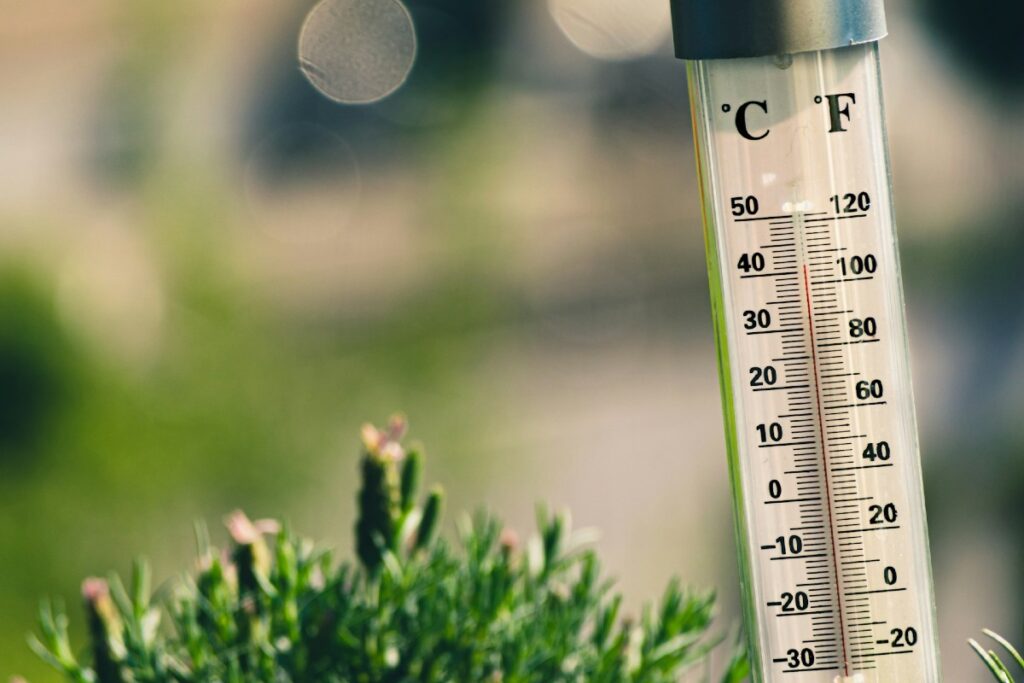
By Jack O’Toole, Capitol bureau | As the world endured its four hottest days on record last week, meteorologists in South Carolina warned of continuing extreme weather events due to climate change.
“You can’t blame global warming for every event because weather is cyclical,” said Rob Fowler, a longtime meteorologist at WCBD in Charleston. “But the earth is clearly getting warmer and these extreme occurrences are going to be happening more frequently.”
He likens the effects of heat to a pot of water on the stove.
“You turn that stove on, the atmosphere starts to bubble and boil,” Fowler said. “So everybody in the state is going to see more extremes – hurricanes, tornados, storms and flooding.”
According to climate experts, efforts to respond to climate change take two principal forms: mitigation, which seeks to lower future temperatures by reducing greenhouse gasses in the atmosphere, and adaptation, which works to prepare communities for the challenges of rising seas and extreme weather.
South Carolina has made efforts in both areas, but to date most real progress in the state has been on the adaptation side of the ledger.
Mitigation: A ‘mixed bag’ on greenhouse gas emissions
According to climate activists and policy makers, South Carolina’s mitigation efforts boil down to two major missed opportunities and a pair of happy accidents.
The first missed opportunity came in 2007, when then-Gov. Mark Sanford announced the formation of a high-level state climate commission, with a goal of reducing greenhouse gas emissions in the state.
“Climate change is real,” Sanford told The State newspaper at the time. “We’re looking at this as an opportunity to lead.”

But according to commission member and Coastal Conservation League founder Dana Beach, the effort fizzled after a promising start.
“We met for about a year, and the group came up with strategies that were very well thought out,” Beach said. “But at the last minute, Sanford decided it was too controversial and then nothing happened.”
The second major lost mitigation opportunity was the spectacular collapse of the V.C. Summer nuclear project in 2017, which ultimately led to prison sentences for top utility executives, including then-SCANA CEO Kevin Marsh, and wound up costing ratepayers $9 billion. With a B. Had the project been completed, it would have added 2,200 megawatts of energy to the S.C. grid with zero greenhouse gas emissions. That’s enough to provide reliable power for about a million homes, which is necessary in a state growing by bounding leaps.
“We’re in such a crisis with climate and carbon, we need to pick our poison,” Beach said of the environmental controversies surrounding nuclear power generation. “But that [project] would have been a mammoth step forward … and we failed to do it because SCANA’s top management was inept and secretive and deceitful.”
But environmentalists also say South Carolina has gotten a couple of things right on the mitigation front, even if unintentionally.
First, the state’s existing nuclear infrastructure, built without climate in mind, is unusually robust, providing more than 50% of the state’s power generation. That’s the third-highest level in the nation.
The second major positive on mitigation has been South Carolina’s emergence as a national leader in land conservation with more than 3 million acres – or more than 15% of the state’s total land – under protection. And S.C. Gov. Henry McMaster has committed to doubling that number to 6 million acres by 2050.
“The single most important mitigation strategy we’ve adopted in this state is forest conservation and restoration,” Beach said. “Every day, we sequester thousands of tons of carbon in the growing forests.”
A ‘regional leader’ on adaptation
Despite the state’s struggles on the mitigation side, climate experts say South Carolina has become a regional leader on climate adaptation – an effort that began in earnest after Hurricane Florence ripped through the state in 2018, causing more than $2 billion in damage.
As a result of those efforts, the S.C. Office of Resilience was created in 2020 to identify the state’s major climate vulnerabilities and assets. As its first major project, the new office began collecting data for a statewide resilience and risk reduction plan that was completed and published in 2023.
“The Resilience Plan is intended to serve as a framework to guide state investment in flood mitigation projects and the adoption of programs and policies to protect the people and property of South Carolina from the damage and destruction of extreme weather events,” SCOR spokesperson Hope Warren said in a statement.
The report contains a total of 54 recommendations for climate adaptation programs, policies and projects.

“What we appreciate about the plan is that it’s giving specific recommendations for funding programs, creating policies and better equipping our state and communities to prepare and adapt,” said Alys Campaigne, climate initiative leader for the Southern Environmental Law Center. “Having this framework is critical to creating needed coordination across agencies and communities to adapt and respond.”
Already, environmentalists say, the plan is having an impact across the state, with new rules requiring homeowners to disclose previous flooding incidents to prospective buyers, and local government projects such as Columbia’s municipal solar and smart surfaces initiatives.
Moreover, data collected by the resilience office has begun to unlock federal dollars for critical state adaptation projects.
Specifically, climate activists point to the $3 million South Carolina received in 2023 to begin work on a climate pollution reduction plan, which is expected to be finalized in 2027. They also note the recently-announced $421 million Environmental Protection Agency grant that South Carolina will share with Virginia and North Carolina to restore coastal wetlands and forests, improve water quality, and reduce risks of floods, fire and heat.
Nevertheless, climate experts say that these adaptation efforts are insufficient without major action on greenhouse gas reductions.
“We need to be doing much more to deliver clean energy and clean transportation options that would ultimately be the most important factors in keeping us out of harm’s way and reducing risk,” Campaigne said.
The S.C. General Assembly is expected to take up a new energy bill in January. Climate activists are vowing once again to stop any effort to fast-track a large-scale new natural gas plant in rural Colleton County – and to fight for a more market-oriented energy policy that treats all sources, including renewables, equally.
- Have a comment? Send to: feedback@statehousereport.com.
S.C. Supreme Court upholds death penalty
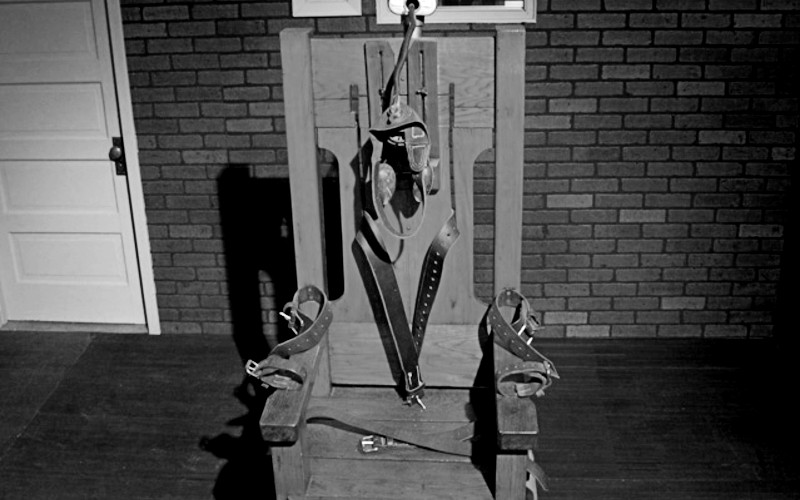
Statehouse Report Staff | The S.C. Supreme Court ruled Wednesday that the state’s death penalty, which now includes a firing squad in addition to lethal injection and the electric chair, is legal.
All five justices agreed with at least part of the ruling, which opens the path to continue executions in a state that hasn’t had one since 2011. South Carolina has executed 43 inmates since the death penalty was restarted in the U.S. in 1976. Nearly all inmates chose lethal injection. The option for firing squad was added in 2023 to circumvent concerns about injections.
In the ruling, two justices, however, wrote they thought the firing squad was not a legal way to kill an inmate, and one justice said the electric chair is cruel and unusual punishment.
But the death penalty law is legal, Associate Justice John Few wrote in the majority opinion, because instead of seeking to inflict pain, the choice between the three execution methods makes the death penalty as humane as possible.
ACLU of South Carolina Executive Director Jace Woodrum denounced the decision and called on the S.C. General Assembly to outlaw all executions, regardless of method.
“The death penalty has no place in our society or under our Constitution,” Woodrum said. “Execution is a costly, ineffective form of cruel and unusual punishment that not only fails to make us safer but raises the possibility of the state killing innocent people in our name.”
It is unclear when executions could restart or whether lawyers for death row inmates will appeal the ruling. South Carolina has 32 inmates on its death row. Four prisoners are suing, but four more have also run out of appeals, although two face competency hearings before they could be executed, according to reports.
State publishes framework for A.I. adoption
A new report from the S.C. Department of Administration (Admin) aims to promote and regulate the use of new artificial intelligence-based technologies in the delivery of state government services.
“The South Carolina’s State Agencies’ Artificial Intelligence (AI) Strategy … outlines the state’s AI vision, guiding principles, goals and actions necessary for the productive and responsible use of AI,” Department of Administration spokesperson Brooke Bailey told Statehouse Report in a statement. “It is meant to serve as a guide for state agencies in the adoption of AI technologies.”
Under the plan, which was developed in partnership with the national management firm Gartner, Admin will launch two new state entities, the Center of Excellence (COE) and the AI Advisory Group (AIAG), to oversee the adoption process. Once in place, the COE’s mission will be to provide “leadership, best practice insight, evaluation and ongoing collaboration,” while the AIAG will “solicit input from the private sector for the purpose of understanding emerging AI technology trends and industry use cases.”
Despite the excitement surrounding AI, Admin stresses that safety, not speed, will be its top concern.
“While Admin is determined to continue collaborating with agencies to assess the potential use for AI technologies to enable continuous improvement for state government and, ultimately, citizens of South Carolina,” Bailey said, “the agency must first build a foundation that securely and safely embraces the power of AI in state government.”
In other recent news:
![]() Voter groups file suit arguing GOP gerrymandering in S.C. is unconstitutional. A voter advocacy group is asking the state Supreme Court to rule on whether South Carolina’s redrawn congressional maps in the state’s 1st District violates the state constitution.
Voter groups file suit arguing GOP gerrymandering in S.C. is unconstitutional. A voter advocacy group is asking the state Supreme Court to rule on whether South Carolina’s redrawn congressional maps in the state’s 1st District violates the state constitution.
S.C. needs thousands of poll workers for November’s election. The S.C. Election Commission will compensate counties for 26,028 poll workers using state taxes. Counties can hire additional workers with their own money.
Court halts Title XI change in S.C. The change meant to accommodate students and teachers’ “gender identity” took effect on Thursday around the country except in a few southern states, including South Carolina.
S.C. spending $2.5M to help families pay for child care but fewer will benefit. As federal COVID relief dollars expire, state spending is not enough to cover families losing scholarship funding.
S.C. Freedom Caucus has new leaders. S.C. Rep. Jordan Pace, R-Goose Creek, is the new chairman of the S.C. House Freedom Caucus, a far-right GOP legislative faction that has frustrated Republican leaders since its creation in 2022.
State agencies spent hundreds of thousands helping Secret Service before primaries. A look at how state agencies helped the Secret Service protect candidates in South Carolina before its primaries.
The red hats
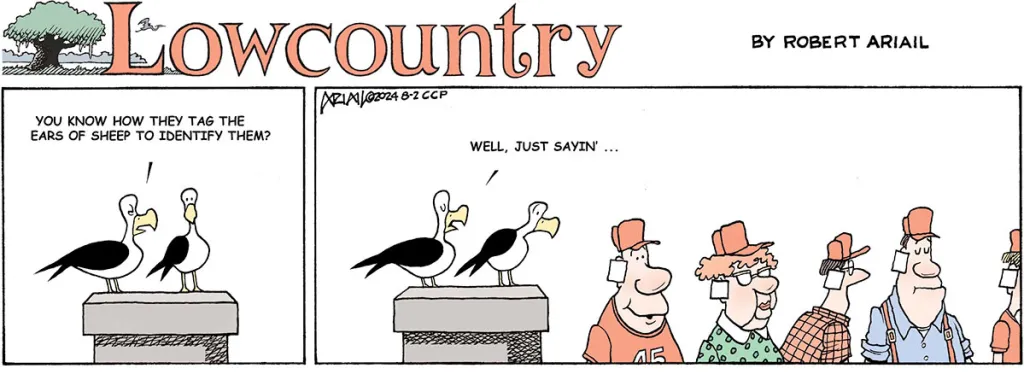
Nationally award-winning cartoonist Robert Ariail always has an interesting take. This week, he takes aim at the intersection of MAGA red hatters and sheep.
- What do you think … love it or hate it? Send your thoughts to feedback@statehousereport.com.
Sales tax holiday remains inane tax bribe
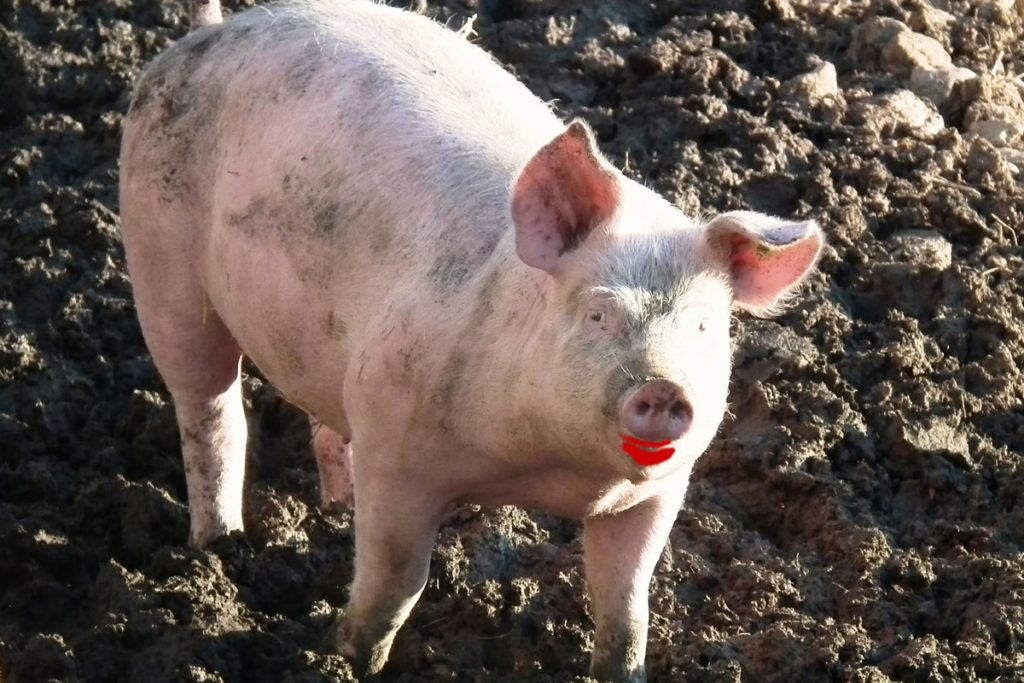
By Andy Brack | It’s THAT time of the year again – the time when the state’s big political bribe to South Carolina voters is in full view to keep them in line with the establishment.
 Yes, from Aug. 2 through Aug. 4, South Carolina celebrates the 2024 Tax Free Weekend – an annual sales tax holiday that started in 2000 to allow shoppers a way to catch a little relief at cash registers as they buy all sorts of back-to-school items.
Yes, from Aug. 2 through Aug. 4, South Carolina celebrates the 2024 Tax Free Weekend – an annual sales tax holiday that started in 2000 to allow shoppers a way to catch a little relief at cash registers as they buy all sorts of back-to-school items.
Things they don’t pay the state’s 6% sales tax plus local option sales taxes on: Bedding, blankets, pillows, sleepwear, towels, wash cloths, shower curtains, diapers. None of which make much sense. Things that do make sense: Clothing, shoes, books, bookbags, lunchboxes, computers, printers, software, calculators and school supplies like pencils, paper, pens, binders and notebooks.
And then there is the list of things that aren’t tax-exempt on this very special holiday weekend, some of which sound like they should be exempt but aren’t: Briefcases, wallets, cell phones, smartphones, glasses, contacts, sports equipment and more. But other items do actually make sense to not be part of the sales tax holiday: Cleaning supplies, business computers, furniture, jewelry, mattresses and box springs, office supplies, and video game consoles.
When all was said and done, shoppers last year purchased more than $30 million of tax-free items, which caused the state of South Carolina to lose $1.8 million in sales tax revenues, according to the S.C. Department of Revenue. In the two decades the state has held the tax-free weekend, it has lost more than $50 million in sales tax revenues, which most people would agree is real money. Think of what could have been done with that.
Bottom line: The sales tax weekend is a gimmick to make politicians who won’t craft a smart tax policy seem like they care about shoppers. It’s just not a fair way to give a tax break to someone. A few years ago, we called tax-exempt weekend nothing more than lipstick on a pig. Still is.
Wouldn’t it be better to figure out a way to provide a longer-lasting tax break throughout the year? You might wonder how. Easy: Lower the state’s uber-regressive 6% sales tax by a couple of pennies with cuts to the 80+ special interest sales tax exemptions offered to businesses throughout the year. Makes sense, but politicians don’t really want to annoy those special interests.
Or maybe state leaders could stop obsessing about the income tax – which tends to be paid by people who can afford it. Maybe they could more evenly apply sales taxes to services to relieve the regressive burden of sales taxes and lower that rate.
The sales tax holiday has another big problem – most people don’t take advantage of it because they forget, don’t realize it existed or aren’t even in the state when it’s happening. The fairness of any sales tax holiday is always in question when its application is inherently uneven.
The tax-free weekend also is a problem for businesses, according to the Tax Foundation: “Rather than stimulating new sales, sales tax holidays simply shift the timing of sales.” That said, most businesses experience slumps after such holidays, which owners complain cuts into steady, reliable, consistent sales that impact cash flow and inventory. In short, sales tax holidays make it tougher for businesses to do business.
From a policy perspective, “there is little economic justification,” the Tax Foundation argues, “for why a product purchased during one time period should be tax-exempt while the same product purchased in another time period should be taxable.”
South Carolinians save less than a dollar per person during the sales tax holiday weekend. Urge your legislators to be smarter about how they craft tax policy, instead of smearing lipstick on that pig to con voters into thinking they’re getting something really important.
Andy Brack is editor and publisher of Statehouse Report and the Charleston City Paper. Have a comment? Send to: feedback@statehousereport.com.
- Have a comment? Send to: feedback@statehousereport.com.
Charleston Animal Society
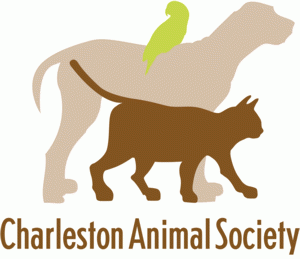 We’re pleased today to shine our spotlight on the Charleston Animal Society, leader in the effort to make Charleston County a safe place for animals. Now the society is working to expand its Charleston success statewide to energize the state to reshape its 300-plus shelters and animal organizations into a no-kill network that stretches from Walhalla to Little River to Daufuskie Island.
We’re pleased today to shine our spotlight on the Charleston Animal Society, leader in the effort to make Charleston County a safe place for animals. Now the society is working to expand its Charleston success statewide to energize the state to reshape its 300-plus shelters and animal organizations into a no-kill network that stretches from Walhalla to Little River to Daufuskie Island.
Safe and healthy communities, neighborhoods and families don’t just happen – they’re built. “No Kill – No Harm – No More” shines a spotlight on animal abuse and family violence, which are often perceived and treated as separate issues. However, animal abuse is often the tip of the iceberg to larger issues in the home, such as child abuse, elder abuse or domestic violence.
- South Carolina’s most honored charity four years in a row
- National model for success
- Southeast’s only AAHA-accredited combined clinic and shelter
- Focused on solving problems rather than reacting to them year after year
- Publishes Carolina Tails, the largest pet magazine in S.C.
No Kill. No Harm. No More. is a “movement” comprised of two major initiatives: No Kill Charleston and No Kill South Carolina.
- Learn more about the Charleston Animal Society and its work to create a network of humane network for the animals that bring joy to our lives.
Colorful
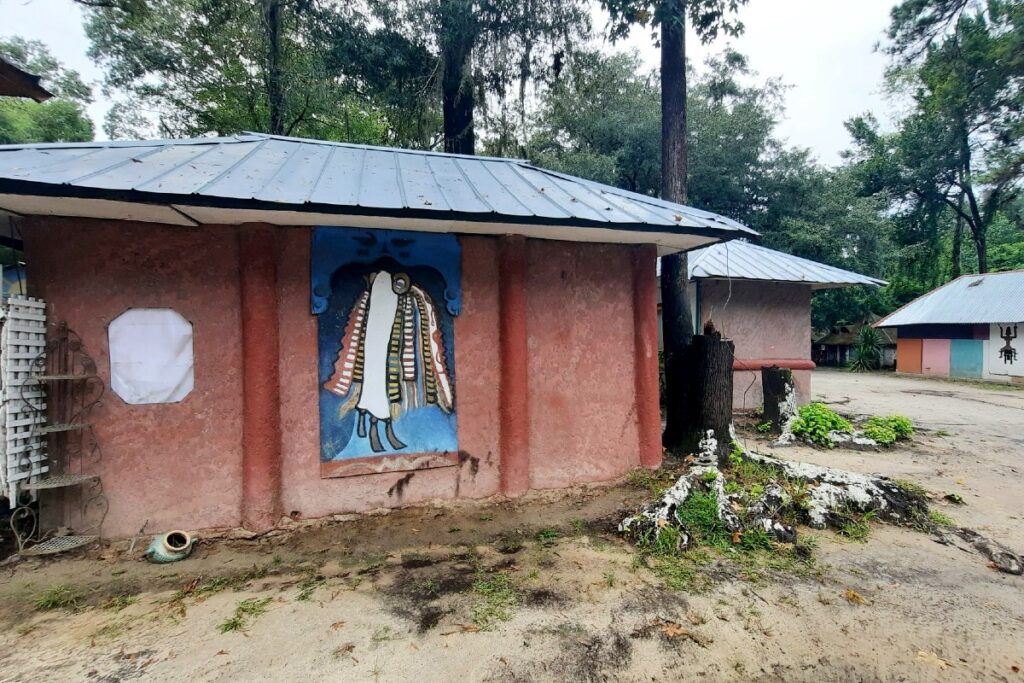
Here’s a colorful scene. Where is it? What is it? Send your name, hometown and guess to: feedback@statehousereport.com. Next week we’ll provide the source and credit information
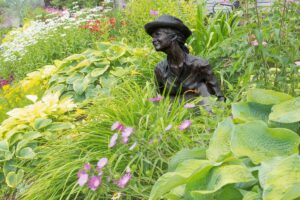 Last week’s mystery, “Outdoor scene,” showed a bronze statue called “The Gardener” in Blowing Rock Memorial Park along Main Street in Blowing Rock, N.C. Thanks to Thomas Jacobsen of Sitka, Alaska, for sending the photo.
Last week’s mystery, “Outdoor scene,” showed a bronze statue called “The Gardener” in Blowing Rock Memorial Park along Main Street in Blowing Rock, N.C. Thanks to Thomas Jacobsen of Sitka, Alaska, for sending the photo.
Allan Peel of San Antonio, Texas, provided quite a bit of information on the statue, which he said “was created by Alexander Michael Hallmark (1949–2021), a member of the National Sculpture Society who was born in Danville, Illinois, but lived much of his adult life in Blowing Rock. The statue was commissioned by Blowing Rock Garden Club and dedicated in August 2006. The figure represents the garden club members who have lovingly tended to the Memorial Park since the club was established in 2001.”
Only four others identified the statue: Pat Keadle of Perry; George Graf of Palmyra, Va.; and Jay Altman and Elizabeth Jones, both of Columbia.
- Send us a mystery picture. If you have a photo that you believe will stump readers, send it along (but make sure to tell us what it is because it may stump us too!) Send to: feedback@statehousereport.com and mark it as a photo submission. Thanks.
Thanks for saying what needed to be said
To the editor:
![]() Kudos to you for saying what needed to be said (and what our elected officials in S.C. refuse to say: Joe Biden has done great things for South Carolina.
Kudos to you for saying what needed to be said (and what our elected officials in S.C. refuse to say: Joe Biden has done great things for South Carolina.
Our hyper-partisan senators and Republican House members are staunchly on the Trump train, regardless of the fact that the train will try to run the U.S. off a cliff.
– Jim Leonard, Summerville
Send us your thoughts
We encourage you to send in your thoughts about policy and politics impacting South Carolina. We’ve gotten some letters in the last few weeks – some positive, others nasty. We print non-defamatory comments, but unless you provide your contact information – name and hometown, plus a phone number used only by us for verification – we can’t publish your thoughts.
-
- Have a comment? Send your letters or comments to: feedback@statehousereport.com. Make sure to provide your contact details (name, hometown and phone number for verification. Letters are limited to 150 words.
ABOUT STATEHOUSE REPORT
Statehouse Report, founded in 2001 as a weekly legislative forecast that informs readers about what is going to happen in South Carolina politics and policy, is provided to you at no charge every Friday.
- Editor and publisher: Andy Brack, 843.670.3996
- Statehouse bureau chief: Jack O’Toole
Donate today
We’re proud to offer Statehouse Report for free. For more than a dozen years, we’ve been the go-to place for insightful independent policy and political news and views in the Palmetto State. And we love it as much as you do.
But now, we can use your help. If you’ve been thinking of contributing to Statehouse Report over the years, now would be a great time to contribute as we deal with the crisis. In advance, thank you.
More
- Mailing address: Send inquiries by mail to: P.O. Box 21942, Charleston, SC 29413
- Subscriptions are free: Click to subscribe.
- We hope you’ll keep receiving the great news and information from Statehouse Report, but if you need to unsubscribe, go to the bottom of the weekly email issue and follow the instructions.
- Read our sister publication: Charleston City Paper (every Friday in print; Every day online)
- © 2024, Statehouse Report, a publication of City Paper Publishing, LLC. All rights reserved.


